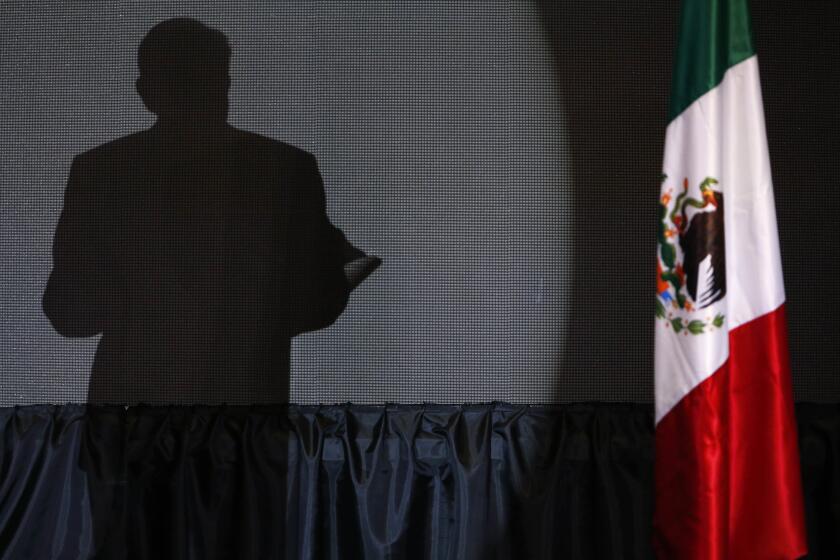New U.S. Point Man on N. Korea Sees Hope
It will be one year in June since the last round of multinational talks aimed at pressing North Korea to stop building nuclear weapons. In that time, the communist regime has declared itself in effect a nuclear power, threatened to resume missile testing and boycott further negotiations, hardened its rhetoric and churned out a steady stream of vitriol against the United States.
To even the most casual observer, the talks are going badly indeed.
But Christopher R. Hill, the new assistant secretary of State for East Asian and Pacific affairs, is being paid to be an optimist. So while critics of the Bush administration’s approach suggest that American officials are flogging a dead horse, Hill says he is not giving up on talks involving the United States, North Korea, Russia, China, Japan and South Korea.
“I’m not quite prepared to pull the plug,” said Hill in an interview Monday at the U.S. Embassy here in the South Korean capital, where he is finishing an eight-month stint as ambassador.
“I still think [the six-party process] is the best mechanism we have for dealing with it, and I would hope that the North Koreans will come around. Certainly the issue is not whether or not we are going to solve this problem ... but how do we solve it.”
Hill, 53, is a veteran of seemingly intractable international conflicts in the Balkans. He helped draft the 1995 Dayton peace accord that ended the war in Bosnia-Herzegovina and was a special envoy during the 1999 crisis in the Serbian province of Kosovo.
Hill said he would like to convince North Korean leader Kim Jong Il that his regime’s insistence on developing nuclear weapons is a relic of a Cold War mind-set.
“I would say, ‘Let’s look at the top 100 problems that North Korea faces,’ ” Hill said, reeling off the North’s litany of disasters, from food shortages to the collapse of its medical sector. “And then I would ask how nuclear weapons could solve any of them.
“I think it should be clear to everybody, and even North Korean leaders, that international prestige is not available by pursuing nuclear weapons.”
At present, it is unlikely that the U.S. will be able to convey its message except in media interviews.
For months, the North Koreans have set various conditions for returning to the talks. To the extent that there have been behind-the-scenes negotiations, they apparently have amounted to nothing more than talking about talking.
Among North Korea’s demands are one-on-one negotiations with the Bush administration. Pyongyang says the nuclear issue is really a matter between the two governments. The U.S. has long held that it is a regional concern for all of North Korea’s neighbors, and Hill summarily ruled out direct talks as “a road that has been closed for permanent repair.”
The North Koreans also appear unlikely to receive the apology they have demanded from Secretary of State Condoleezza Rice for comments she made in her confirmation hearings early this year, when she labeled North Korea “an outpost of tyranny.”
Hill refused to discuss deadlines or any ultimatum. When the process has come to a dead end, he said, “we will know it when we see it. We are not there yet.”
He also was mum on what the United States might pursue next, saying that even discussing the subject of other options “would suggest we don’t think this one is the right way to go. It undermines the chances of success.”
Despite Hill’s upbeat tone, many observers are decidedly pessimistic about restarting the talks. Charles L. “Jack” Pritchard, a former top U.S. negotiator on North Korea and now a critic of U.S. policy toward the regime, said that privately, many officials in the Bush administration have given up.
“I think internally they’ve made a decision that this process is not going to work. There is a high level of frustration,” Pritchard said in a telephone interview.
Pritchard believes that the administration is preparing to turn to the United Nations, perhaps seeking a resolution condemning North Korea over the nuclear issue, since it is unlikely that the U.S. could muster the support for a stronger measure imposing full-fledged sanctions.
With the U.S. unwilling to acquiesce to the North’s conditions and the North Koreans backing themselves into a corner, the best hope of a breakthrough comes from China. There are reports that Chinese President Hu Jintao will visit Pyongyang in the coming months to push for the regime’s return to the talks, and a request from such a powerful neighbor might be difficult to resist.
Hill says he hopes China can bring whatever leverage it has to bear on North Korea.
“We have left it up to the Chinese how they should get them to the talks,” he said.
If nothing else, a silver lining of the North Korean nuclear negotiations has been better working relations between the U.S. and China. It is more than a slight consolation.
“I consider the six-party process with respect to China one area where we can really work together for a common interest,” Hill said. Even if the six-party process doesn’t help with North Korea, he added, “it has a lot of positive externalities and spinoffs.”
More to Read
Sign up for Essential California
The most important California stories and recommendations in your inbox every morning.
You may occasionally receive promotional content from the Los Angeles Times.










